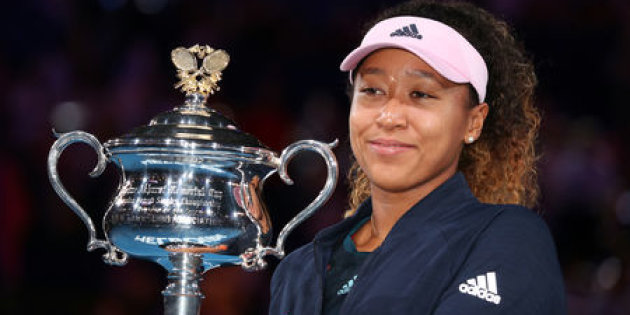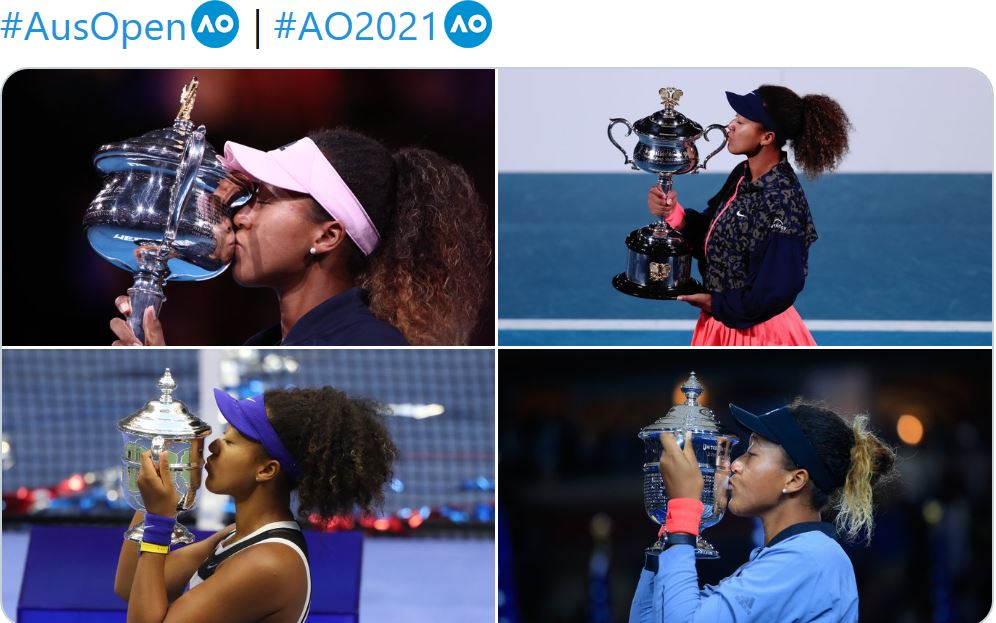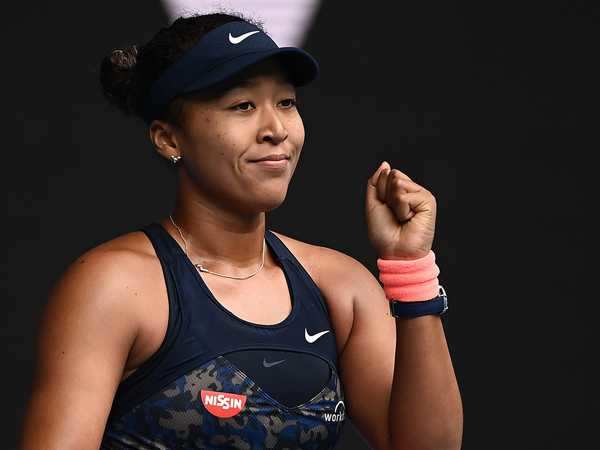Re: Naomi Osaka
: 19 lut 2021, 0:02
Forum fanów tenisa ziemnego, gdzie znajdziesz komentarze internautów, wyniki, skróty spotkań, statystyki, materiały prasowe, typery i inne informacje o turniejach ATP i WTA.
https://www.mtenis.com.pl/
Naomi Osaka nie dała żadnych szans Amerykance Jennifer Brady, która po raz pierwszy wystąpiła w wielkoszlemowym finale. Japońska tenisistka dała koncert skutecznego tenisa i po raz drugi wygrała Australian Open.
Łukasz Iwanek
Na taki turniej czekały od US Open 2019. Elise Mertens i Aryna Sabalenka pokazały moc
W finale Australian Open 2021 doszło do starcia wielkiej mistrzyni, Naomi Osaka (WTA 3) z pretendentką, Jennifer Brady (WTA 24). Japonka walczyła o czwarty wielkoszlemowy tytuł, drugi w Melbourne (2019). Miała szansę jako pierwsza tenisistka od czasu Moniki Seles (lata 90. XX wieku) wygrać pierwsze cztery finały imprez tej rangi. W półfinale US Open 2020 Osaka pokonała Brady po trzysetowej bitwie. Tym razem Japonka zwyciężyła 6:4, 6:3 i ponownie rządzi w Australian Open.
Brady od początku borykała się ze swoją największą bronią, czyli z serwisem. W drugim gemie miało już 40-0, ale udało się jej utrzymać podanie po męce na przewagi. W czwartym oddała podanie podwójnym błędem. Osaka była na korcie aktywniejsza. W jej zagraniach było dużo swobody i precyzji, zmieniała kierunki dobrze wykorzystując geometrię kortu. Brady była zestresowana i funkcjonowała na spowolnionych obrotach, musiała dużo biegać poza linią końcową i miała ograniczone pole do przeprowadzania ataków. Osaka również nie serwowała nadzwyczajnie. Silny wiatr nie ułatwiał zadania w tym elemencie obu tenisistkom.
W piątym gemie Brady wytrzymała dłuższą wymianę, którą zakończył bekhendowy błąd Japonki. W ten sposób Amerykanka zaliczyła przełamanie powrotne, ale nie można napisać, że to pomogło jej odnaleźć rytm. Stać ją było na pojedyncze dobrze przeprowadzone ataki. Nie było konsekwencji w jej grze, za to jej poczynaniami rządziły chaos i niecierpliwość. W ósmym gemie Brady zniwelowała break pointa, a po chwili miała okazję na 5:4. Tym razem z opresji wybrnęła Osaka kapitalnym krosem forhendowym. Amerykanka nie wytrzymała presji i oddała podanie ze stanu 40-15. Pospieszyła się i podjęła kilka złych decyzji. Set dobiegł końca, gdy zepsuła woleja.
Rozpędzona Osaka popisała się kapitalnym bekhendem, który dał jej break pointa na 2:0 w II secie. Brady miała za mało argumentów i nie była w stanie przerwać koncertu Japonki. Amerykanka niewiele mogła zdziałać, gdy całkowicie zawodził ją serwis. Bez niego była kompletnie bezradna i rozregulowana. W czwartym gemie oddała podanie pakując forhend w siatkę. Osaka głębokimi piłkami po krosie i po linii rozrzucała rywalkę po korcie i punktowała ją ze stoickim spokojem.
Japonka nie uciekała się do maksymalnej mocy swoich uderzeń, jej tenis był urozmaicony, dobrze czytała grę i jej dominacja nie podlegała dyskusji. Prezentowała solidność i spryt w obronie i ataku. W końcówce pojawiło się trochę emocji. Osakę jeden punkt dzielił od prowadzenia 5:0, ale na chwilę spuściła z tonu i oddała podanie psując bekhend. Trudno było to jednak nazwać pożarem, nawet małym. Amerykanka, która nie miała nic do stracenia, trochę lepiej utrzymywała piłkę w korcie, ale Japonka cały czas miała sytuację pod kontrolą. Moment zakończenia meczu został lekko odroczony w czasie. Przy 5:3 Osaka przypieczętowała triumf wygrywającym serwisem.
W trwającym 77 minut meczu Osaka zaserwowała sześć asów, a Brady miała tylko dwa. Japonka zdobyła 22 z 30 punktów przy swoim pierwszym podaniu. Dwa razy została przełamana, a sama wykorzystała cztery z pięciu break pointów. Naliczono jej 16 kończących uderzeń przy 24 niewymuszonych błędach. Amerykance zanotowano 15 piłek wygranych bezpośrednio i 31 pomyłek. Osaka podwyższyła na 3-1 bilans spotkań z Brady.
Osaka została siódmą tenisistką, która zwyciężyła w Melbourne po obronie piłek meczowych. Odparła dwie w IV rundzie z Garbine Muguruzą. Japonka dołączyła do Moniki Seles (1991), Jennifer Capriati (2002), Sereny Williams (2003 i 2005), Na Li (2014), Andżeliki Kerber (2016) i Karoliny Woźniackiej (2018). Brady do finału Australian Open awansowała jako piąta singlistka notowana poza Top 20 rankingu od 2000 roku. Mogła zostać najniżej klasyfikowaną mistrzynią od czasu Sereny Williams (81. pozycja w 2007).
Dla Osaki był to 18. wielkoszlemowy występ i zdobyła czwarty tytuł. Oprócz Australian Open dwa razy triumfowała w US Open (2018, 2020). Brady zanotowała 14. start w imprezie tej rangi. Do ubiegłorocznego US Open nigdy nie doszła dalej niż do IV rundy. Japonka legitymuje się teraz bilansem 7-3 singlowych finałów w głównym cyklu, a w przypadku Amerykanki jest to 1-1. W poniedziałek Osaka awansuje na drugie miejsce w rankingu, a Brady zadebiutuje w Top 20 (na 13. pozycji).
Australian Open, Melbourne (Australia)
Wielki Szlem, kort twardy, pula nagród 71,5 mln dolarów australijskich
sobota, 20 lutego
finał gry pojedynczej:
Naomi Osaka (Japonia, 3) - Jennifer Brady (USA, 22) 6:4, 6:3


Australian Open champion Naomi Osaka joins the WTA Insider Podcast to reflect on her business-like fortnight in Melbourne and looks ahead to the challenge of matching her hardcourt results on clay and grass. Gotta catch 'em all.
By Courtney Nguyen - WTA Insider
Osaka Australian Open Getty
Photo by Getty Images
Naomi Osaka has never been shy about her ambitions. In an interview with The New York Times at the 2016 Australian Open, where she defeated Elina Svitolina in the first round, the then 18-year-old was asked about her career ambitions. She proceeded to quote the Pokemon theme song.
"To be the very best, like no one ever was,” Osaka said.
Flash forward five years, and the now four-time major champion has another Pokemon adage on the mind: Gotta catch 'em all.
On Saturday, Osaka capped off yet another triumphant fortnight at a hardcourt major, defeating Jennifer Brady 6-4, 6-3 to win her second Australian Open title. The win was Osaka's 21st consecutive victory and moved her incredible record once she advances to the quarterfinals of a Slam to 12-0. Now up to No.2 in the rankings on Monday, Osaka is the first woman since Monica Seles to win her first four major finals.
With two US Open and two Australian Open titles under her belt, Osaka has not shied away from the obvious question: Can she replicate her hardcourt success on the clay and grass?
Osaka's coach, Wim Fissette, is confident in her potential on the natural surfaces.
"She's kind of a natural mover on the court and just seeing the way she moves, the way she has the easy power, the way she can build the points, there are a lot of things that I see why she could really perform well on clay. But she needs matches and she needs confidence in those matches and confidence in a certain game plan.
"I remember in the past when, a long time ago, when I was working with Kim [Clijsters] and she didn't play many tournaments on clay. She was playing great tennis but as soon as she would miss a few balls, she would doubt a lot of things. She would doubt her game plan, she would doubt, like, oh, maybe I should have gone bigger on this ball, maybe I should have been more patient on this ball. I think when you don't have a lot of experience of success on those surfaces, that's easy to start doubting.
"If Naomi plays on hard court and she goes for the forehand winner and she misses, she will say, Okay, next time I will make it. But maybe on those [other] surfaces she will think, Oh, maybe I should have hit with a little more margin, maybe I should have done this. So it's easy to start doubting.
"So for me, we have to use opportunities to play a lot of matches, hopefully be successful, but otherwise also learn from those losses eventually. And then I'm sure she will be successful on both surfaces. Maybe this year, but if not this year, probably next year. But I don't see any restrictions of her playing well on those surfaces."
Osaka joined the WTA Insider Podcast after her Australian Open win to reflect on the keys to her title run, what she needs to do to complete her set of Grand Slam trophies, and why she's already looking forward to another run on European clay.
WTA Insider: What's the overwhelming feeling right now?
Osaka: I think the overwhelming feelings for me, just after winning New York, I really wanted to start the year off really well. And I don't think that there's a better tournament to win than this one.
WTA Insider: How would you characterize your two weeks in Melbourne? It seemed like it was a fairly settled two weeks for you.
Osaka: Yeah, I would say for me, I felt like I had a very clear vision of what I wanted to achieve. Even if I didn't win or anything, I just wanted to keep a very good attitude and establish that I fought for every point and I tried as hard as I could. That led me to the win. But honestly, I would have been OK if I didn't get the trophy today.
Osaka Australian Open Getty
Photo by Getty Images
WTA Insider: So much of the discussion over the last two weeks has been about how your team has evolved and really gelled over the last 12 months. Your coach, Wim Fissette, was very appreciative of how open you've been with them. Can you talk about that evolution and how it's helped you?
Osaka: Yeah, I think when I was younger, I used to try to shoulder everything by myself. I didn't want to trouble anyone with my stress and my burdens.
But after talking to Wim, he told me that it's easier for him to try to logically talk about the things that are worrying me than for me to just sort of close everyone in my team off. I think that really helped me a lot. It's kind of almost become like a routine now, where we would just talk more than anything.
WTA Insider: Was it difficult for you to be vulnerable to them?
Osaka: I would say in the beginning it was, yes, because I didn't want to trouble anyone. And for me, I barely speak to people outside my family anyway. So it was a bit weird to tell them that I felt uncomfortable in situations, or that I feel kind of stressed or sad and things like that. So I think there was a bit of processing time.
WTA Insider: What did you tell them before the final? What were you feeling?
Osaka: Yeah, I told them the truth. I told them that I was nervous. It worries me a lot because I wasn't sure what to expect.
I think that's the greatest fear for me, the unknown, not knowing what's going to happen. But I guess that's also a part of life and it's honestly a privilege to even be playing here right now. And everyone practices to play in the finals of a Slam, so I should just be happy to be here in the end.
"I don't think I feel totally comfortable on either surface because I didn't really play on red clay or grass growing up and I've played on hard basically my whole life."
WTA Insider: What do you think is the key to succeeding off of the hard courts?
Osaka: I think on clay, I feel like I don't play bad. I honestly thought I played pretty well last year. I just didn't go far in the Grand Slam like everyone expected me to. But I think that's also a process.
I feel like I have everything that I need to do well on clay and on grass, but it's just [about] feeling comfortable. I don't think I feel totally comfortable on either surface because I didn't really play on red clay or grass growing up and I've played on hard basically my whole life. So, yeah, just more experience.
WTA Insider: To your point, in 2019 you made the semifinals of Stuttgart and back-to-back quarterfinals in Madrid and Rome. Is it just a mental thing on clay? Learning to enjoy it?
Osaka: I think definitely it's a mental thing. I know that the last time I played in the French Open, I lost to Siniakova, but I had opportunities. I really remember thinking I was able to win that much, but in the end, it didn't go my way. I think that the more I play on it, the better I'll get.
Osaka 2019 Madrid JJ
Photo by WTA/Jimmie48
WTA Insider: Are you excited for that challenge?
Osaka: I feel more excited than anything. I think there's a feeling of doing something for the first time and wanting to be good at a lot of different things. For me, it's a real priority. And I also kind of want to complete my set of trophies. I'm missing two. Hee Hee.
WTA Insider: You're chasing them like Pokemon. Gotta catch them all.
Osaka: Kind of.
WTA Insider: Since you turned pro in 2014, you have played less than 35 professional matches on grass. Is that something you can internalize in order to transform yourself into a good grass-court player?
Osaka: Honestly for grass, I can definitely say it's an issue of experience because I don't really feel comfortable on the surface. But I think every year that goes by, I learn more. I talk to more people.
There are some people that can tell how the ball's going to bounce by the height of the blade. I don't even understand what that means, but I guess they're that experienced. So hopefully I'll get there one day.
"I think Wim's keeping a notebook of things that he wants to work on and I'm also never satisfied. I think that's why we also make a pretty good team."
WTA Insider: When you left the US Open, you wanted to work on your return. Leaving Melbourne, are there things that you're inspired to work on based on your experience there?
Osaka: Yeah, I think definitely. I feel that's also a human thing. We're never satisfied. We always have things that we want to work on. I think Wim's keeping a notebook of things that he wants to work on and I'm also never satisfied. I think that's why we also make a pretty good team.
WTA Insider: Do you have a sense of what your schedule is looking at going forward?
Osaka: Honestly, I'm not really sure. I feel like there are so many things that are happening in the world. You can never really be too sure about anything schedule-wise.
WTA Insider: What's the first thing you want to do in terms of celebrating? You looked a bit unsure about the glass of champagne you were offered at your press conference.
Osaka: I just want to go into my hotel room and sleep. I'm not really a big party person or anything. I'm just excited to go home.
